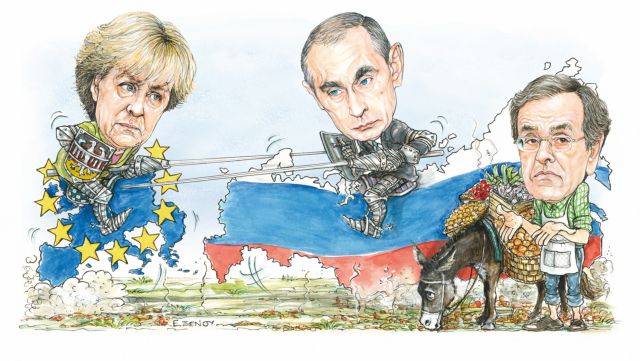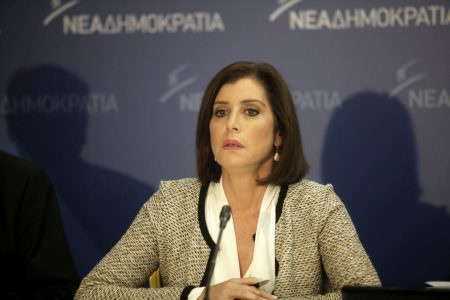Since the time of Peter the Great and Katherine, the dominant German urban class has been mesmerized by Russia and has always been friendly towards the East.
The growth of the Russian Empire at the time, the many opportunities in the vast country and the potentially huge market peaked the interest of German producers and capitalists.
It is indicative that in various times in history the two countries approached each other, signing various financial and military cooperation agreements.
Even during wars the German side requested alliance or neutrality from Russia.
The non-aggression pact signed by Ribbentrop and Molotov in August 1939, shortly before the German forces invaded Poland is a characteristic example.
Contemporary analysts attribute the current German-Russian approach – after the collapse of the so-called real socialism in 1989 – to this timeless perception of German interests in the East.
Some even believe that the German governments undermined European unification in favor of the Russian opportunities as they were more interested in the East than the West.
In one respect the documented intention to “Germanize” Europe is linked to the German interests in Russia and the East. It is also true that after the socialist collapse and unification, the German elite started toying with the idea of a new German hegemony in the East and West. The intensification and expansion of German investments in Eastern Europe was a key development to this opportunity.
At present there are about 3,000 German businesses in Russia, most of which are in the high tech sector. Official data shows that over 300,000 Germans have focused their interests in Russia.
It is said that the great turn to Russia occurred during Gerhard Schröder‘s time, who – as it is well-known – assumed a key position in the Russian energy giant Gazprom after he left the Chancellery. The German penetration in Russia though really picked up during Angela Merkel‘s reign.
Lately though, after the events in Crimea and later in Ukraine, the German operation has come across many difficulties.
A while back Helmut Schmidt had criticized the German expanse to Russia and spoke aggressive against those who seemed prepared to sacrifice the German European tradition of the post-war decades in favor of an opportunistic and contentious expanse to the East.
The truth is that Merkel messed up in Ukraine. The presence of the German Minister of Foreign Affairs in the streets of Kiev during the demonstrations against the pro-Russian Yanukovych was absolutely problematic and pigeonholed German politics. This became even more problematic when the groups of Ukrainian Nazis got the upper hand and attempted to leave their mark not just in the political developments, but also in the relationship with Russia. Since then a lot has happened, with the shooting down of the Malaysia Airlines Boeing, which claimed the lives of 298 innocent passengers and crew, being the most tragic.
Quite a few believe that Germany essentially lost, once again, on an international level. It lost the game in Ukraine and had to accept the good American services in order to get out of the corner it got itself into in the historically problematic East.
Germany is essentially trapped in the Ukrainian crisis and is obligated to support the sanctions against its until-recently friend and great ally, Russia, which is anything but inconsequential.
Putin and the oligarchs around him are already experiencing a huge problem. They are in danger of being marginalized by the international financial system, losing the privilege of attracting funds and facing huge cash-flow problems for the businesses and themselves personally.
As we all know, the Russian state businesses and Russian moguls based their international activities on the vast funds that they traded unhindered worldwide. Their clumsy counter-measures, the embargo against agricultural products from Europe and the West in general, perfectly illustrates how huge and complicated the Ukrainian crisis is and how capable it is to result in a global financial war with immense consequences for the European economy.
Under these circumstances, the German leadership can see that the eastern vision is lost, at least for the next 4-5 years, since bringing peace will not be easy, as indicated by the military exercises and concentration of Russian forces on the Russian-Ukrainian border.
The truth is that the Ukrainian crisis allowed the Americans to convince the Germans that the geopolitical game is in the hands of others, that Europe is their own playing field and that they have the responsibility to construct a democratically organized European union.
That is more or less how Germany has been forced by circumstances and unwillingly to return to European affairs.
Germany’s effort to dominate in Europe has caused reactions and conflicts in many countries and the retreat from the eastern front of opportunities has limited German capabilities.
It is no coincidence that in the past few days Wolfgang Schäuble felt the need to speak of the the gift of peace, which he said was greater than the economy, on the 100th anniversary of the commencement of the First World War.
At present Germany has almost “returned” to Europe in order to work more systematically towards its unification, but now there are many skeptics who will by no means accept the construction of a German Europe.
The negotiations for the commissioners and the grouping of countries around certain divs is indicative of the change in circumstances. The selection of Dimitris Avramopoulos for the Commission was anything but random and entirely linked to the shift of balances between Washington, Berlin and Brussels.
It is also no random fact that Mateo Renzi is stating demands, claiming the portfolio of Foreign Affairs and it is no small fact that the German influence on the European Central Bank is starting to wane and that Juncker is building a Commission of strong personalities, which will have a voice and will not be entirely subjugated and passive, as it had been until recently to Berlin.
The USA‘s politics
Limited global hegemony
The Americans are pressuring the Germans as much as they can demanding a reform of German politics and greater focus on the European construction. They are essentially asking for them to invest resources and favor strong financing policies that are capable of releasing Europe from the misery of the Stability Pact and the fixation with monetary targeting.
They also took over handling the Russian-Ukrainian crisis by pressuring the Russians as much as necessary, even though nobody can safely predict how much President Putin is trapped by the Imperial doctrine which he exalts in Russia.
It is true that Barack Obama recognizes Russia’s international role and wants to be allies, despite the sanctions and the internal pressure from the conservatives who want conflict and a return to Cold War conditions.
The American President is using Russia in the Middle East and Iran, he wants Russia to counter Chine and intervene in the conflict with North Korea. He would rather have Russia with him rather than against him, especially in these troubled times.
It appears that at present the Americans have decided to disengage from military operations around the world and are truing to manage their global hegemony with tools and means.
In the Middle East and North Africa they have invested in splitting up old states and creating new ones, based on religion, race and national identity, wherever they exist, in hopes of developing into satellites, even in the extremist Islamic cases.
They would also like a Palestinian state somewhere on the Sinai Peninsula between Egypt and Israel, but know that there is no easy solution there, since extreme voices that thrive on violence have dominated on both sides.
The American departure from the military fronts though has exacerbated tensions on a local level. At present the war zones all over the world are multiplying; from Nigeria, Libya, Israel and Palestine, to Syria, Iraq, Kurdistan and Russia, there are ongoing military operations that are capable of affecting dramatic changes to the world. The outbreak of the Ebola virus in Western Africa, which can threaten health worldwide is also not to be taken lightly.
The European path and the home front
We live in an age of profound financial turmoil, in an era of great geopolitical and financial changes, all of which will determine the structure and order of interests in the new world. The question is what place may Greece have in this changing world?
How much can neighboring Turkey be influenced by the instability on its doorstep and how will Tayyip Erdogan‘s expansionism in the Aegean materialize, over the EEZs and the upcoming surveys for underwater natural gas and oil reserves?
As time goes on and instability entrenches itself in the Southeast Mediterranean it increasingly becomes obvious that Greece has no chance outside the European foundation. The experience of the financial crisis confirmed this and the geopolitical instability is a daily reminder.
Outside of Europe Greece would almost instantly become a pariah and aside from the huge financial loses, would also suffer national loses. The potential exacerbation of political conditions in the greater region could threaten Greek stability and national security. This should convince every sane person that Greece should not consider anything other than the most efficient integration in European institutions.
Despite the common understanding of our chances outside of Europe, the home front remains problematic and trapped by political forces that are unable to rise up to the demands of our age.
The Prime Minister Antonis Samaras is trying to manage the situation. Lately he is trying to take advantage of the German retreat and the opportunity presented by Juncker, but beyond that, he is plagued with internal strife in his government and party.
While he will get involved in the small management battles, he appears to avoid the main battle of great changes, despite the rumors to the contrary.
Similarly, SYRIZA has not demonstrated its true intentions regarding the huge changes, despite its claims in government policy. Their announcements have a greater resemblance to a counter-reform rather than a reform in line with the times.
In these conditions one would expect from a strong challenger for authority to adopt a model of great changes that would result in a new tactical state capable of making great investments, guiding young people in private investments, offering a real education compliant with the needs of our country, administering justice and selecting for President a dear div who will symbolize Greek unity and nothing else.
Despite the moaning and crying, the country has the opportunity and capability of taking advantage of the weaknesses of the strong, especially the world’s need for a new balance.
Antonis Karakousis





